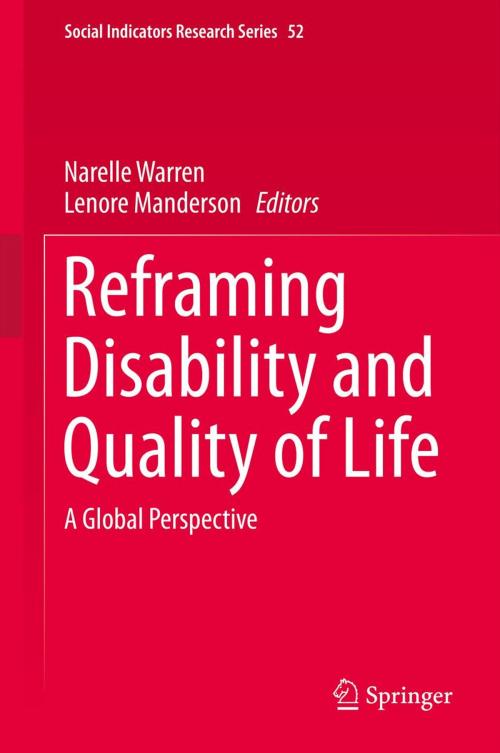Reframing Disability and Quality of Life
A Global Perspective
Nonfiction, Health & Well Being, Medical, Reference, Public Health, Social & Cultural Studies, Social Science, Sociology| Author: | ISBN: | 9789400730182 | |
| Publisher: | Springer Netherlands | Publication: | March 12, 2013 |
| Imprint: | Springer | Language: | English |
| Author: | |
| ISBN: | 9789400730182 |
| Publisher: | Springer Netherlands |
| Publication: | March 12, 2013 |
| Imprint: | Springer |
| Language: | English |
This volume brings together two parallel fields of interest. One is the understanding among psychologists and other social scientists of the limits to psychometric measurement, and the challenges in generating information about quality of life and wellbeing that enable comparison across time and place, at both individual and population levels. The second is the interest among anthropologists and others in the lived experience of chronic illness and disability, including the unpredictable fluctuations in perceived health and capability. Chronic conditions and physical impairments are assumed to impact negatively on people’s quality of life, affecting them psychologically, socially and economically. While some of these conditions have declined in prevalence, as a result of prenatal diagnosis, early successful interventions, and changes in medical technology and surgery, many of these conditions are on the increase as a consequence of improved life-saving medication and technology, and greater longevity. ‘Quality of life’ is often used as an indicator for successful and high quality health services, and good access to medical attention and surgery – for hip replacements or laser surgery to improve vision, for instance. But it is also used as an argument against interventions, when such interventions are seen to prolong life for its own sake. Yet we also know that people vary their idea of quality as a result of the context of fluctuations in their own health status, the presence or absence of pain or discomfort, and as a result of variations in social and economic contextual factors. In exploring these questions, this volume contributes to emerging debates related to individual health outcomes, but also to the social and other individual determinants that influence everyday life. Understanding these broader contextual factors will contribute to our knowledge of the kinds of services, support systems, and infrastructure that provide people with good ‘quality of life’ and a sense of wellbeing, regardless of their physical health, capability and functioning. The volume includes scholars from all continents who have been encouraged to think critically, and to engage with the descriptive, methodological, social, policy and clinical implications of their work.
This volume brings together two parallel fields of interest. One is the understanding among psychologists and other social scientists of the limits to psychometric measurement, and the challenges in generating information about quality of life and wellbeing that enable comparison across time and place, at both individual and population levels. The second is the interest among anthropologists and others in the lived experience of chronic illness and disability, including the unpredictable fluctuations in perceived health and capability. Chronic conditions and physical impairments are assumed to impact negatively on people’s quality of life, affecting them psychologically, socially and economically. While some of these conditions have declined in prevalence, as a result of prenatal diagnosis, early successful interventions, and changes in medical technology and surgery, many of these conditions are on the increase as a consequence of improved life-saving medication and technology, and greater longevity. ‘Quality of life’ is often used as an indicator for successful and high quality health services, and good access to medical attention and surgery – for hip replacements or laser surgery to improve vision, for instance. But it is also used as an argument against interventions, when such interventions are seen to prolong life for its own sake. Yet we also know that people vary their idea of quality as a result of the context of fluctuations in their own health status, the presence or absence of pain or discomfort, and as a result of variations in social and economic contextual factors. In exploring these questions, this volume contributes to emerging debates related to individual health outcomes, but also to the social and other individual determinants that influence everyday life. Understanding these broader contextual factors will contribute to our knowledge of the kinds of services, support systems, and infrastructure that provide people with good ‘quality of life’ and a sense of wellbeing, regardless of their physical health, capability and functioning. The volume includes scholars from all continents who have been encouraged to think critically, and to engage with the descriptive, methodological, social, policy and clinical implications of their work.















